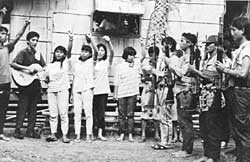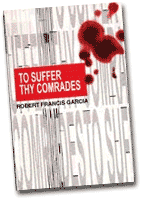 Written by a guerrilla who nearly lost his life in the violent internal purges of the communist party, To Suffer Thy Comrades is an insider account of the Philippine killing fields. The New Peoples' Army grew out of a peasant uprising in the 1950s and has been fighting Asia's longest-running insurgency. Some 25,000 have been killed since 1986, and as this book shows, many of them died at the hands of their own comrades.
Written by a guerrilla who nearly lost his life in the violent internal purges of the communist party, To Suffer Thy Comrades is an insider account of the Philippine killing fields. The New Peoples' Army grew out of a peasant uprising in the 1950s and has been fighting Asia's longest-running insurgency. Some 25,000 have been killed since 1986, and as this book shows, many of them died at the hands of their own comrades. This book documents the paranoia of the party high command that triggered the snowballing Stalinist decimation of its own cadres in the vicious internal purges of the late 1980s. Unlike many similar testimonies told after the nightmare ended-from Hitler's gas chambers to Soviet gulags to Pol Pot's genocide-this one talks of the atrocities in a movement that still continues, and does so with remarkable depths of psychological insights.
In the book's introduction, a scholar at Kyoto University says one more difference is that the author, despite his traumatic ordeal, "still believes in the need to overcome human misery through a process that empowers the poor". To those ends, he believes that this book will provide a cathartic cleansing of a movement that started nobly but lost itself in paranoia, ironically at a time when the political situation was clearly in its favour.
In the mid-1980s, the Marcos dictatorship was disintegrating after the assassination of opposition leader Benigno Aquino. But the political middle forces were in disarray, mainly because of lack of experience and incompetence. It was only the Communist Party of the Philippines and its New Peoples\' Army that had a country-wide presence. How such a seemingly invincible revolution could dissipate its energies, how it could devour its own children with extreme brutality is what the author examines, often with vintage Filipino irreverence and wit, to provide for himself and many other victims what he hopes will be an emotional closure of a painful experience.
The book comes in three parts. The first describes life in the guerrilla camp, arrest, interrogation and torture. The incredulity and shock at being denounced as an army 'deep penetration agent' by one's comrades-and often people one recruited to the cause-comes across powerfully. The description of the methods of torture is sickeningly familiar to readers of Arthur Koestler or Alexander Solzhenitsyn. If Hannah Arendt talks of the banality of evil, one can also talk of its universality across time and cultures.
The second part, aptly entitled Methods in Madness, is a short history of the CPP-NPA, the recruitment and indoctrination of its cadres, and the background behind the two internal purges of 1982 and 1985, mainly the latter that so seamlessly degenerated into a murderous orgy. The section includes wrenching accounts by tortured comrades as well as a description of the various emotional phases of the victims and the techniques they used for psychological survival.
 The third part is deeply analytical and is entitled Rot in the Root. It attempts to look at "the multiplicity of factors that converged and interacted in a given historical frame" to produce such excesses of human pain. The author argues that these purges were not an aberration, that there was something fundamentally flawed in the revolutionary movement itself that spiralled downwards towards violence.
The third part is deeply analytical and is entitled Rot in the Root. It attempts to look at "the multiplicity of factors that converged and interacted in a given historical frame" to produce such excesses of human pain. The author argues that these purges were not an aberration, that there was something fundamentally flawed in the revolutionary movement itself that spiralled downwards towards violence. The first was the revolutionary brand of justice, which was always swift and arbitrary. As long as it was applied to 'the other' (ie, government soldiers), it did not strain the organisation. However, once the CPP-NPA began to look within to find explanations for battlefield defeats, it entered dangerous terrain. Clandestine, underground organisations are sustained by camaraderie of trust, wherein the boundary separating the good 'us' from the bad 'them' is sacrosanct. Admitting that the inside was infected, coupled with a revolutionary context that did not recognise due process, meant that a suspect was already guilty and confessions had to be extracted by whatever means.
Once this sacred boundary was breached, medieval torture techniques found fertile soil that was made ready planting by an autocratic culture among the leadership, mob syndrome among the lower cadres and a fear syndrome at both levels that fuelled the vicious cycle. The author describes how, despite the belief that Marxist revolutionary movements are suffused with egalitarianism, they are in reality rigidly hierarchic with all major decisions taken by a handful at the top. The ideology-despite its perfunctory cautioning against dogmatism-is an idolatrous worship of the wisdom from on high that precludes all other schools of thought which are easily banished with pejoratives such as 'reformist' or 'reactionary'.
All these factors conspire to kill humane individualism and critical thought. The compulsions to obey, to douse independent thinking or sense of injustice, become the imperatives for survival. Tragically, they also contribute to many idealistic innocents-potential citizens of a bright tomorrow-being tortured and killed. To Suffer Thy Comrades won the Philippine National Book Award in 2002, and has created a sensation in the country.
This book provides interesting parallels with events in Nepal. In describing how, at the height of their strength and popularity, the CPP-NPA fell into the paranoid path, the author writes: ". certainty of struggle gave way to confusion of reality. Marcos was down, Cory was up, and we, the Left, didn't quite know what hit us."
Similar lines could be written about the Nepali Left, whether it was their boycott of the national referendum in 1980 or of walking away from the peace talks-and safe political landing-in 2003. For the discerning analyst, the book holds many insights about political cultures and (in)compatibilities of alliances between middle ground liberal democrats, welfare socialists and the paranoid fringes. It should be required reading.
Dipak Gyawali was a minister in the Chand cabinet that negotiated the last ceasefire with the Maoists.


